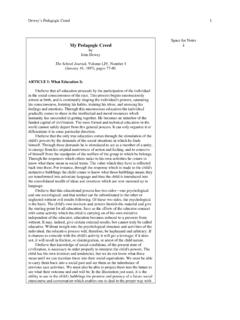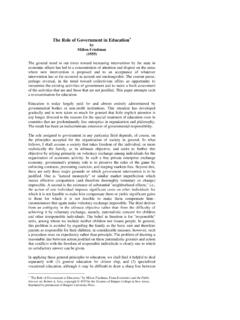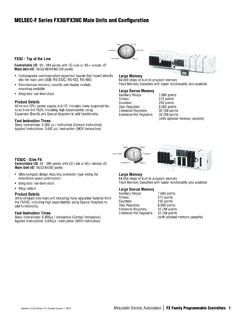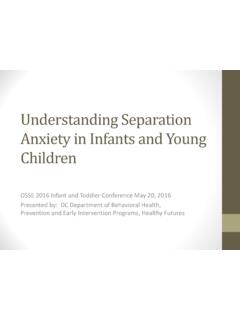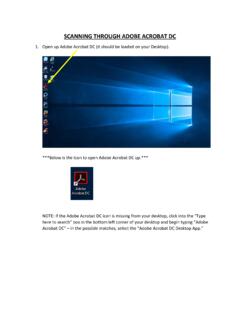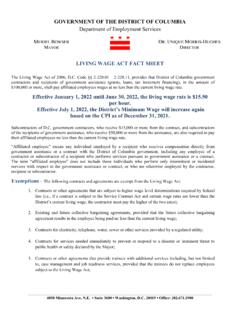Transcription of THE QUEEN v. DUDLEY AND STEPHENS December 9, 1884
1 THE QUEEN v. DUDLEY AND STEPHENSD ecember 9, 1884 Criminal Law -- Murder -- Killing and eating Flesh of Human Being underPressure of Hunger -- "Necessity" -- Special Verdict -- Certiorari -- Offence onHigh Seas -- Jurisdiction of high CourtA man who, in order to escape death from hunger, kills another for the purpose of eating hisflesh, is guilty of murder; although at the time of the act he is in such circumstances that hebelieves and has reasonable ground for believing that it affords the only chance of preserving the trial of an indictment for murder it appeared, upon a special verdict, that the prisoners S.
2 , seamen, and the deceased, a boy between seventeen and eighteen, were cast away in astorm on the high seas, and compelled to put into an open boat; that the boat was drifting on theocean, and was probably more than 1000 miles from land; that on the eighteenth day, when theyhad been seven days without food and five without water, D. proposed to S. that lots should becast who should be put to death to save the rest, and that they afterwards thought it would bebetter to kill the boy that their lives should be saved; that on the twentieth day D., with the assentof S., killed the boy, and both D.
3 And S. fed on his flesh for four days; that at the time of the actthere was no sail in sight nor any reasonable prospect of relief; that under these circumstancesthere appeared to the prisoners every probability that unless they then or very soon fed upon theboy, or one of themselves, they would die of starvation: --Held, that upon these facts, there was no proof of any such necessity as could justify theprisoners in killing the boy, and that they were guilty of for the murder of Richard Parker on the high seas within the jurisdiction of the trial before Huddleston, B.
4 , at the Devon and Cornwall Winter Assizes, November 7,1884, the jury, at the suggestion of the learned judge, found the facts of the case in a specialverdict which stated that, on July 5,1884, the prisoners, Thomas DUDLEY and Edward STEPHENS , with oneBrooks, all able-bodied English seamen, and the deceased also an English boy, betweenseventeen and eighteen years of age, the crew of an English yacht, a registered Englishvessel, were cast away in a storm on the high seas 1600 miles from the Cape of GoodHope, and were compelled to put into an open boat belonging to the said yacht.
5 That inthis boat they had no supply of water and no supply of food, except two 1 lb. tins ofturnips, and for three days they had nothing else to subsist upon. That on the fourth daythey caught a small turtle, upon which they subsisted for a few days, and this was the onlyfood they had up to the twentieth day when the act now in question was committed. That2on the twelfth day the remains the turtle were entirely consumed, and for the next eightdays they had nothing to eat. That they had no fresh water, except such rain as they fromtime to time caught in their oilskin capes.
6 That the boat was drifting on the ocean, and wasprobably more than 1000 miles away from land. That on the eighteenth day, when theyhad been seven days without food and five without water, the prisoners spoke to Brooks asto what should be done if no succour came, and suggested that some one should besacrificed to save the rest, but Brooks dissented, and the boy, to whom they wereunderstood to refer, was not consulted. That on the 24th of July, the day before the act nowin question, the prisoner DUDLEY proposed to STEPHENS and Brooks that lots should be castwho should be put to death to save the rest, but Brooks refused to consent, and it was notput to the boy, and in point of fact there was no drawing of lots.
7 That on that day theprisoners spoke of their having families, and suggested it would be better to kill the boythat their lives should be saved, and DUDLEY proposed that if there was no vessel in sightby the morrow morning, the boy should be killed. That next day, the 25th of July, novessel appearing, DUDLEY told Brooks that he had better go and have a sleep, and madesigns to STEPHENS and Brooks that the boy had better be killed. The prisoner Stephensagreed to the act, but Brooks dissented from it. That the boy was then lying at the bottomof the boat quite helpless, and extremely weakened by famine and by drinking sea water,and unable to make any resistance, nor did he ever assent to his being killed.
8 The prisonerDudley offered a prayer asking forgiveness for them all if either of them should betempted to commit a rash act, and that their souls might be saved. That DUDLEY , with theassent of STEPHENS , went to the boy, and telling him that his time was come, put a knifeinto his throat and killed him then and there; that the three men fed upon the body andblood of the boy for four days; that on the fourth day after the act had been committed theboat was picked up by a passing vessel, and the prisoners were rescued, still alive, but inthe lowest state of prostration.
9 That they were carried to the port of Falmouth, andcommitted for trial at Exeter. That if the men had not fed upon the body of the boy theywould probably not have survived to be so picked up and rescued, but would within thefour days have died of famine. That the boy, being in a much weaker condition, was likelyto have died before them. That at the time of the act in question there was no sail in sight,nor any reasonable prospect of relief. That under these circumstances there appeared tothe prisoners every probability that unless they then fed or very soon fed upon the boy orone of themselves they would die of starvation.
10 That there was no appreciable chance ofsaving life except by killing some one for the others to eat. That assuming any necessity tokill anybody, there was no greater necessity for killing the boy than any of the other threemen." But whether upon the whole matter by the jurors found the killing of Richard Parkerby DUDLEY and STEPHENS be felony and murder the jurors are ignorant, and pray the adviceof the Court thereupon, and if upon the whole matter the Court shall be of opinion that thekilling of Richard Parker be felony and murder, then the jurors say that DUDLEY andStephens were each guilty of felony and murder as alleged in the indictment.



